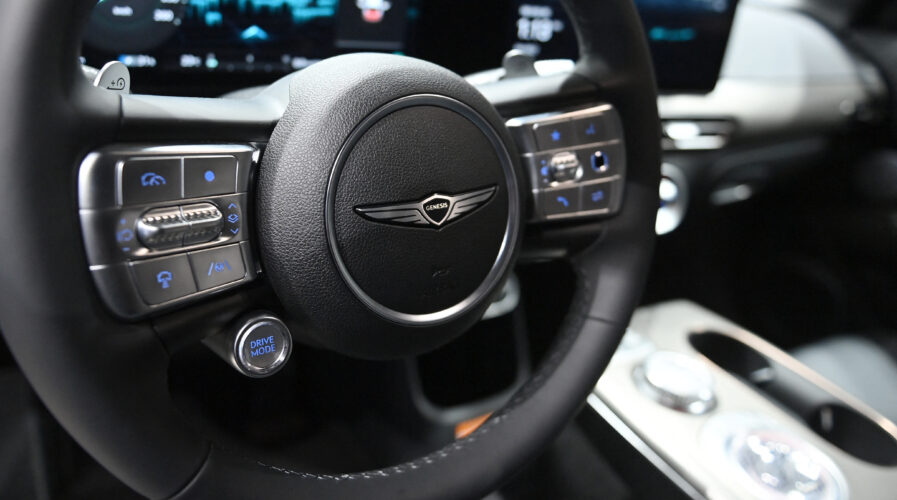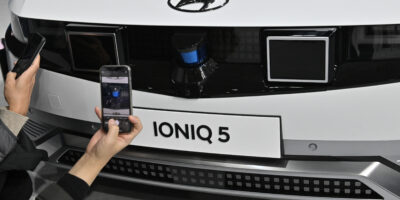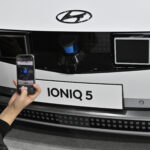
Hyundai Motor is investing US$16bn in EVs by 2030. Here’s their plan. (Photo by Jung Yeon-je / AFP)
Hyundai Motor is investing US$16bn in EVs by 2030. Here’s their plan
- When Hyundai Motor Group outlined its electrification strategy through 2030, it included 17 new BEV models.
- The automaker’s approach to electrification includes an investment of nearly US$80 billion in hardware and software technologies.
- By the end of the decade, Hyundai Motor looks to capture 7% of the global EV market.
In 2021, Hyundai Motor Group launched its first electric vehicles (EVs) for each brand, as it attempts to speed up its electrification strategy. The company doesn’t seem to be slowing down its electrification plan for now as the South Korean automaker recently announced that it plans to sell 1.87 million battery electric vehicles (BEVs) annually by 2030.
To achieve that goal, Hyundai is strengthening its line-up by introducing 17 new BEV models by the end of this decade — 11 for Hyundai models and six for its Genesis luxury brand. Shared during its virtual 2022 CEO Investor Day, Hyundai Motor CEO Jaehoon Chang also outlined several steps of the accelerated strategy.
The end goal is to capture a larger piece of that BEV pie and secure a 7% of global market share by 2030, Chang said. “The roadmap for Hyundai’s battery electric vehicle (BEV) is supported by: strengthening BEV line-ups, optimizing manufacturing capacity, and securing hardware and software competitiveness,” the company’s press release reads.
Hyundai and its plans for EVs
Last year in May, Hyundai Motor announced it would invest US$7.4 billion to develop and produce EVs in the US by 2025. This was followed by an announcement in September that the company had committed to becoming globally carbon neutral by 2045.
This year, Hyundai Motor raised the annual BEV sales target to 1.87 million units by 2030 from previously announced 560,000 units by 2025. The planned 17 BEV models would include three sedan models, six SUVs, one light commercial vehicle as well as one new type model. The BEV line-up for Genesis consists of two passenger cars and four SUVs, including the Electrified GV70 launching this year.
Starting in 2025, all newly launched models from Genesis will be electrified. To support its entire electrification goal, Hyundai Motor also aims to establish a high efficiency manufacturing process for BEV production. “Hyundai Motor Global Innovation Center in Singapore (HMGICS), the cornerstone for innovation in the company’s mobility value chain, will build a human-centered manufacturing innovation platform,” the statement reads.
The platform, according to Hyundai, is expected to bring dramatic innovation in production efficiency through a flexible production system, advanced level automation and digital twin technology. The innovation will be expanded to global plants in the future.
Currently, the existing BEV production facilities centers in Korea and the Czech Republic, However, Hyundai plans to gradually expand its BEV manufacturing bases, starting with an Indonesian plant that recently started operation. The Indonesian plant will start BEV production this year to help expand production volume.
Amidst expansion of its BEV production bases, the company is trying to increase the local procurement rate of batteries through strategic alliances with battery companies in major regions, including the US, to secure sufficient battery supply. “Through these alliances, the company expects to obtain more than 50% of its next-generation lithium batteries for BEVs starting in 2025,” Hyundai said.
Currently, according to the company, it has secured sufficient battery supply to meet its sales targets by 2023. Hereon, Hyundai plans to continue cooperation with various battery companies with an aim of securing 170 GWh of batteries for its models, including Genesis luxury brand by 2030.
Hyundai also noted that it is cooperating with various global partners on next-generation batteries to improve energy density and cost efficiency.
Long-term financial goals
Chang highlighted that the company earmarked KRW95.5 trillion (US$79.3 billion) of investment for future businesses by 2030, which includes KRW 19.4 trillion (US$16 billion) for electrification and KRW 12 trillion (US$10 billion) for software capabilities.
By 2030, Hyundai targets to achieve an operating profit margin of 10% or higher in EV businesses by enhancing competitiveness in hardware and software capabilities with an expanded line-up. On a consolidated basis, it aims to secure an operating profit margin of 10 percent.
“Hyundai is successfully accelerating its transition to electrification and becoming a global leader in EVs despite a challenging business environment caused by the global chip shortage and ongoing pandemic. Along with our seamless efforts to improve EV value, Hyundai Motor will continue to secure its business sustainability as a ‘Mobility Solutions Provider’ through advanced technologies of not only hardware but also software,” Chang said.
READ MORE
- Ethical AI: The renewed importance of safeguarding data and customer privacy in Generative AI applications
- How Japan balances AI-driven opportunities with cybersecurity needs
- Deploying SASE: Benchmarking your approach
- Insurance everywhere all at once: the digital transformation of the APAC insurance industry
- Google parent Alphabet eyes HubSpot: A potential acquisition shaping the future of CRM


